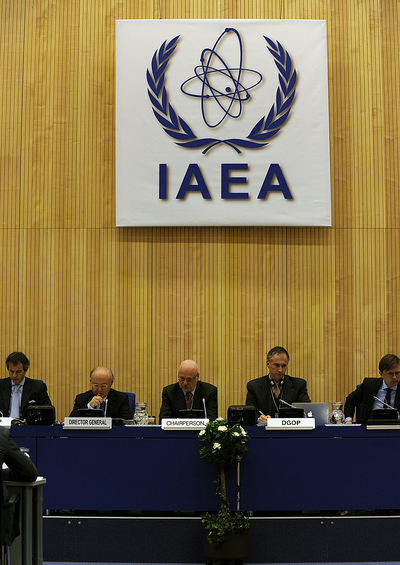How to Succeed in Nuclear Talks With Iran
A nuclear deal with Iran would give the United States four major strategic advantages.
February 4, 2015

If you believe the U.S. mainstream media, nuclear talks with Iran are pointless. And even if one were to posit that there was a point to conducting them, if only for diplomacy’s sake, there ultimately is no hope of finding a middle ground.
This view is widespread because U.S. negotiators, when talking with the press, try to manage expectations. Opponents of the Obama Administration then use those pessimistic news reports to argue the President should never have tried diplomacy with Iran.
Given this, you might be surprised to hear that the P-5 nuclear talks with Iran have already achieved something nobody expected: There is something the United States could propose that is both in its own national interest and likely to lead to a favorable immediate agreement.
What is the proposal?
The U.S. government could agree to ask Israel to submit to the same inspection regime as Iran – provided that Iran agrees to key provisions ensuring that it cannot develop a nuclear weapon in under a year.
Israel might object to this – but it would be hard to draw conclusions from the objection because Israel has already objected to any deal whatsoever. Inspections would not, however, affect Israel’s military stance in any way. And they might serve as a useful reminder of the country’s deterrent capability.
As far as U.S. interests are concerned, such an arrangement would greatly strengthen the U.S. position that all countries should sign the Non-Proliferation Treaty (Iran has, but Israel has not) and permit IAEA inspections.
What the United States gains
Such an agreement has four major strategic advantages for the United States:
1. It meets U.S. Secretary of State Kerry’s requirement for providing a layer of security to Israel – namely, keeping the so-called “breakout time” it takes Iran to enrich enough uranium to build a bomb to at least a year.
Mind you, Iran will always be able to race to produce nuclear weapons. But by limiting its labs to about half the centrifuges currently in use – 4,500 vs. 10,000 – Iran would essentially agree not to be able to surprise anyone. That is the most anyone can hope to achieve diplomatically and strategically – short of a regime change.
2. Twin nuclear inspections in Iran and Israel would eliminate the two main excuses cited by other powers in the region to start an arms race. One is that Israel should not be the only country that gets to ignore the rules – and the other is the fear that Iran could go nuclear in secret.
3. Such a nuclear agreement would permanently strengthen Iranian moderates and permanently weaken its extremists. Even conservative Republicans say the United States must think more strategically about Iran’s politics.
Former Bush Administration officials candidly regret that the politics of the time kept it from taking advantage of an opportunity when the moderate Khatami regime reached out to it in 2003.
4. A nuclear deal with Iran gives the United States leverage in several Middle East hot spots that it largely ceded when it invaded Iraq and removed Saddam. Prior to the ill-fated 2003 invasion, it was Saddam’s army that largely provided the key constraint on Iranian power.
Since Saddam’s removal, Iran has come to dominate politics in Iraq and Yemen as well as Lebanon and Syria in a manner that any serious minded U.S. strategist, including those in the very conservative camp, must urgently want to reverse.
Better relations with Teheran advance U.S. interests
In Iraq itself, the U.S. government was lucky that the somewhat moderate current Iranian president exercised his influence on its behalf when Hassan Rouhani helped eject Iraqi Prime Minister Al-Maliki from power in 2014.
Remember, it was repeated violent affronts of Al-Maliki’s corrupt, sectarian and purely Shia-based government that convinced Sunni ex-officers from Saddam’s army to back the Islamic State. This fact of life on the ground in Iraq must figure prominently in any U.S. calculations about the broader politics of doing a nuclear deal with Iran.
In addition, Iran has influence with the Houthis that have just toppled Yemen’s government – leaving them as the only force that can resist Al Qaeda in the Arab Peninsula, the group claiming credit for the Charlie Hebdo assassinations.
That, too, is a strategic U.S. interest – the realization of which is dependent on Washington smartly applying a different calculus in its dealings with Iran.
What about Iran’s interest? Why would Iran ever agree to a deal with tangible advantages to the United States on several fronts?
The answer is straightforward: Nothing is more important to Iran than regional leadership – and getting Israel to concede even just a little transparency gives it a harmless way to claim it.
This means that a deal is in Washington’s hands. After a quite disastrous decade or so of trying to influence the strategic balance in the Middle East, most of which backfired badly on the United States and its interests, this is the moment to take a fresh and sober look at where the United States’ real interests lie.
Rather than serving ideological demons, the United States should ask itself pragmatically: What’s in it for us? The practical advantages are overwhelming.
Takeaways
If you believe the US mainstream media, nuclear talks with Iran are pointless.
The US government could agree to ask Israel to submit to the same inspection regime as Iran.
Why would Iran ever agree to a deal with tangible advantages to the US on several fronts?
Nothing is more important to Iran than regional leadership.
This is the moment to take a fresh and sober look at where the US’s real interests in a deal with Iran lie.

